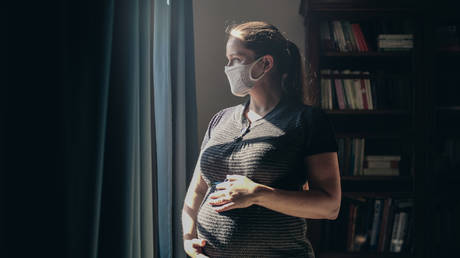
Pregnancy-related deaths for US mothers rose in the first year of the Covid-19 pandemic, with black women far more affected
Data released by the US National Center for Health Statistics on Wednesday show a rise in pregnancy-related deaths for mothers across America in 2020, a growing trend that disproportionately affects non-white women.
There were 861 maternal deaths in 2020 (or 24 deaths per 100,000 births). Those fatalities include women who died during childbirth, sometime during their pregnancy, or within 42 days following pregnancy.
The numbers are a rise from 2019, in which an average of 20 deaths among mothers per 100,000 births was recorded by US health officials, with a total of 754 fatalities. The year before that, the number stood at 17 deaths per 100,000, or a total of 658. The numbers rise more dramatically when focused solely on non-white mothers. Pregnancy-related deaths for black mothers jumped from 44 every 100,000 births in 2019 to 55 the next year. For Hispanic mothers, the number climbed from 13 to 18 during the same period.
READ MORE: US cites race as reason for lung cancer treatment stalling
Possible reasons for the disparities and the overall jump in deaths were not detailed in Wednesday’s report, though the coronavirus likely played some role, researchers said.
“We observed increases across a broad number of categories, and Covid-19 likely contributed,” Donna Hoyert, author of the report, told AFP about the results.
The maternal mortality rate in the US, however, has been facing steady inclines for years, along with obesity rates and heart disease, while many other countries have seen these numbers drop as medical care becomes more advanced.
Health officials reacted to Wednesday’s report by pointing to hurdles in the US to actually getting medical insurance, and said disparities in care were only made clearer by the pandemic.
“The pandemic has uncovered the disparities in access to care, healthcare quality and delivery,” Dr. Janelle Bolden, assistant OB-GYN professor at Northwestern University’s Feinberg School of Medicine, told the Associated Press about the report. “It has also laid bare the lack of support for public health and social agencies that many people rely on for basic needs.”




